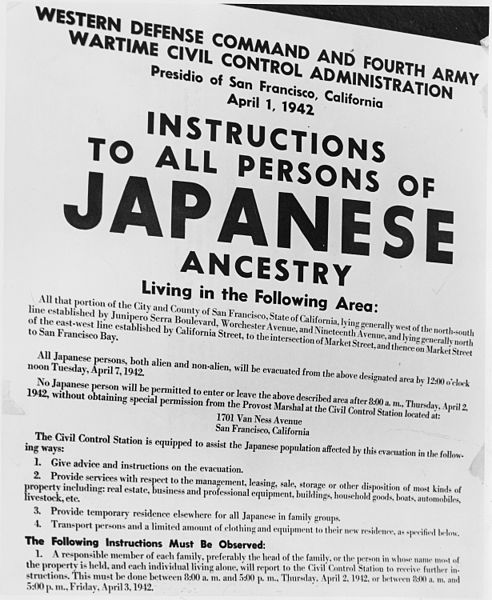Some thoughts on the Internment of the Japanese

One of the first dates I had with my husband, was a trip to see Min Yasui, one of the plaintiffs in a suit related to the Korematsu case trying to fight the internment of the Japanese by the U.S. government during World War II. I was young, maybe still 18 at the time. I knew a bit about the history of the internment, but not a lot. Mr. Yasui was impressive. Even in advanced age, his personality crackled. It was a good lesson for me on the failure of stereo-typing, as he was a firebrand, fitting with his occupation as a lawyer.
Why do I bring this up? Well, recent news has someone close to the Trump campaign (but not in his transition) citing Korematsu as precedent, which drew a gasp from Megyn Kelly. This is not surprising, as currently, the case is generally felt to be embarrassing, and a mistake. Don’t believe me? Here’s quote showing how far the idea that Korematsu was a bad decision has penetrated legal circles:
Justice Antonin Scalia has ranked Korematsu alongside Dred Scott, the 1857 decision that black slaves were property and not citizens, as among the court’s most shameful blunders.
That was recognized in 1983 shortly before I heard Mr. Yasui speaking. I remember at the time they were discussing the fact that the Korematsu had gotten his original conviction overturned, but since it was only at the appellate level, the original ruling still stood at the Supreme Court level. They actually wanted the case to advance, because they felt the time was ripe to have it overturned. It didn’t, so it’s still sitting out there are precedent. This article explains some of the legal niceties, and includes this surprising quote about Scalia above.
I remember as I was in my 20s running into folks in my grandmother’s generation, who would still defend the Internment. Heck, my grandmother herself made a number of embarrassing statements on the subject in my teens. In my late twenties, I was editor of the local Friends of the Library newsletter, and wrote a piece on materials on the Internment available through the Oakland Public Libraries Asian branch. I got a letter from an older member who tried to explain that I didn’t understand. Since he was a member, I couldn’t call him a deluded racist, but stood my ground explaining that history has taught us to view the events differently, and I thought it had.
A recent article in Time puts this point of view succinctly….
As TIME pointed out, the Supreme Court precedent would still stand, but the judge who cleared Korematsu’s conviction declared in her ruling that, in the words of the report of the Commission on Wartime Relocation, “Korematsu lies overruled in the court of history.”
But what if that’s wrong? What if the court of history is reconvening? Think about a case that even Antonin Scalia thought was wrong is being relied on for policy by folks in the President-elect’s orbit.




